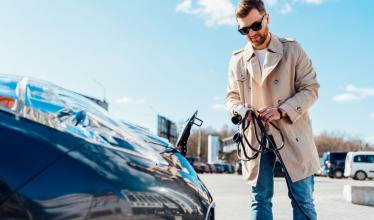Sono Motors claims to be working on a bidirectional AC wall box and is currently running a survey for customers to vote for their favourite design. The German company expects the home charger launch to coincide with Sono Motors’ Sion solar car coming to market in 2023.
With the product, Sono Motors said it was “fulfilling the community’s desire for an affordable wall charging station that is suitable for charging at home as well as for vehicle-to-grid (V2G) and vehicle-to-home (V2H)”. While Sono has not yet set a price, being AC rather than DC like most bidirectional charging devices on the market, it should be cheaper, the Munich-based startup reports.
As a benchmark, Sono said that comparable wall-mounted charging points can cost up to €6,000 plus installation cost. However, in the case of the Sion wall box, the cost saving is in the alternating current, meaning Sono does not need an inverter in the wall box and can therefore “massively save costs here,” as the company pointed out. “This is expected to make our model up to 70% more affordable than DC devices,” Sono added, meaning in the “lower four-digit range”.
In terms of power, the Sono wall box will feature an integrated Type 2 charging cable capable of delivering (or supply) 11 kW AC to the car (and grid). Being bidirectional (i.e. V2G ready), the wall box will turn the Sion EV into a mobile power source able to feedback electricity into the grid or house. Sono claims a full charge for the electric car will take five hours at home.
The company also looks at the reverse functionality that will focus on vehicle-to-home (V2H) before V2G, mostly due to legislative constraints. The company is developing a home energy management system (HEMS) that takes control of when the Sion is charged and discharged, according to Sono. “The HEMS monitors the grid connection point to the house, and if, for example, you have a rooftop PV system and produce more electricity than you need, the Sion is charged using that excess,” the company explained. The communication works via ethernet or wifi (WLAN).
In terms of the electric car supplying the house, Sono estimates that the car’s battery will hold enough energy to cover an average household consumption of 10 kWh per day for four people for up to five days. The battery has a capacity of 54 kWh. For comparison, a stationary home storage unit usually has a 5-15 kWh capacity. But, of course, it all depends on the actual individual power consumption.
Sono Motors is currently running a survey where users can opt for one of three designs and two cable options. The Sono Wallbox was developed together with German manufacturer Kostal. As with the Sion solar car, the charging device can be reserved free of charge, with deliveries set for 2023. The company is currently holding about 14,000 reservations for the upcoming electric car.



